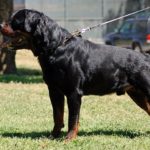Rottweilers are prone to specific health issues, one of which is cancer. Cancer is a significant cause of death in Rottweilers, and owners must be informed of the symptoms, causes, and therapies for cancer in their loyal companions. Understanding and managing cancer in Rottweilers may raise their chances of survival and quality of life. This article will look at the many forms of cancer that Rottweilers are susceptible to, as well as the actions that can be done to identify, diagnose, and treat cancer in Rottweilers.
Types of Cancer Commonly Found in Rottweilers
Some of the most common cancers seen in Rottweilers include osteosarcoma, a form of bone cancer; lymphoma, a type of cancer that affects the lymphatic system; and hemangiosarcoma, a type of cancer that affects the blood vessels. Mast cell tumors, a sort of skin cancer, and mammary tumors, a type of breast cancer, are two more types of cancer that may arise in Rottweilers. Because these tumors are cancerous and may spread to other organs, it is critical to discover and treat them as soon as possible. Furthermore, Rottweilers are predisposed to cancers like prostate, testicular, and melanoma. Rottweiler owners must be aware of the signs and symptoms of cancer and seek medical treatment if they believe their dog has cancer. Regular check-ups, screenings, and early diagnosis are critical for Rottweilers with cancer to enhance their chances of survival and quality of life.
Symptoms of Cancer in Rottweilers
Cancer in Rottweilers may manifest in a number of ways, and owners must be aware of the signs and symptoms of cancer in their dogs. Some typical cancer symptoms in Rottweilers include:
- Lumps or masses: These may occur anywhere on the body and might be hard or firm to touch.
- Appetite loss: Cancer patients may lose interest in meals or have difficulties eating or swallowing.
- Weight loss: Even if dogs are eating normally, cancer may cause them to lose weight.
- Lethargy: Cancer patients may be weary or less energetic than normal.
- Vomiting or diarrhea: Cancer may cause digestive troubles, and these symptoms might indicate a problem.
- Difficulty breathing: Cancer may spread to the lungs, making breathing difficult.
- Cancer may cause the body to create fewer red blood cells, resulting in anemia.
- Limb lameness or swelling: Cancer that affects the bones may produce limb lameness or edema.
- Changes in behavior: Cancer may lead dogs to become more aggressive or to exhibit behavioral changes.
Rottweiler Cancer Risk Factors
Rottweilers are in danger of acquiring cancer owing to a variety of risk factors such as age, gender, obesity, pollutants, genetics, and viruses. Cancer risk rises with age, and male Rottweilers are more susceptible to some forms of cancer than females. Overweight or obese Rottweilers are more likely to acquire some forms of cancer, including mammary tumors. Certain genetic predispositions and infections may also enhance Rottweiler’s cancer risk. Regular check-ups, screenings, and early diagnosis are critical for Rottweilers with cancer to enhance their chances of survival and quality of life.
Early Detection of Cancer in Rottweilers
Early cancer detection in Rottweilers is critical for increasing survival and treatment success. Rottweilers are susceptible to cancers such as osteosarcoma, hemangiosarcoma, and lymphoma. To diagnose cancer early, Rottweiler owners must be aware of the indications and symptoms of cancer, which include unexplained weight loss, loss of appetite, lethargy, and lameness. Regular vet visits, which include bloodwork and x-rays, may also aid in early detection. Rottweilers are also predisposed to specific genetic predispositions that might increase the risk of cancer, thus breeders must evaluate their breeders for these predispositions. Overall, early discovery of cancer in Rottweilers may considerably enhance survival and treatment effectiveness, therefore Rottweiler owners should be aware of the signs and symptoms of cancer and schedule frequent vet check-ups.
Conclusion: Importance of Regular Check-Ups and Early Detection
In conclusion, regular check-ups and early detection are very important. Being aware of the signs and symptoms of cancer, such as unexplained weight loss, loss of appetite, lethargy, and lameness, as well as arranging frequent vet check-ups that include bloodwork and x-rays, will help in the early detection of cancer. Overall, understanding and managing cancer is critical for Rottweiler’s health and should be a top concern for owners and breeders.







